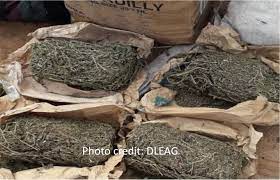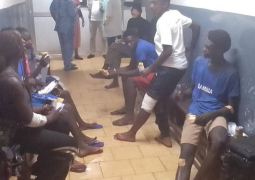
Walking through street-ghettoes in urban Gambia and even in major provincial towns, one would draw a conclusion why cannabis sativa is no doubt one of the most notorious illicit drugs abused in the country.
However, the use of this illegal drug saw rapid surge in its consumption amid covid-19 pandemic, which has forced many sectors on the brink of collapse.
With many out of job in both private and public sectors, many youth, who are hardest hit by the pandemic resorted to engaging in cannabis production to make ends meet.
The Drug Law Enforcement Agency-The Gambia (DLEAG) established in 2005, as an autonomous security outfit pursuant to Section 4 of the Drug Control Act (DCA) 2003, is the leading government security outfit charged with the responsibility of enforcing the drug control Act and all international protocols and conventions relating to drug signed and ratified by The Gambia.
Statistics obtained from the narcotic agency, revealed that from 1st December of 2019 to 31st January 2021, the agency seized 2 tonnes, 748kg, 200g, 700mg of cannabis, 228kg, 695g, 100mg of hashish, 2tonnes, 954kg 6g, 800mg of cocaine and 8g of Heroin.
“The informal sector was seriously hit by the lockdown and the attendant hardship forced people into cannabis production. Since the labour force has potentially increased, it is obvious that this will translate into production,” Lamin J. Gassama, the agency director of Intelligence, Investigation and International Cooperation explained.
Increased abuse of cannabis and control drugs
Gassama further added: “The increase in production and the limited number of operational staff facilitated the inflow of large quantities of cannabis. Prices are lower than normal and access becomes easy,” he posited, claiming:
“The premature closure of the tourist season pushes the informally employed youth in the tourism sector to the streets. They become increasingly engaged in the sales and abuse of cannabis.”
He added; “Ecstasy has flooded the market and many young people (particularly girls) ventured into its abuse. The lockdown resulting in the closure of night clubs, lead to occasional secret house/private parties during which drugs are made available. Ecstasy is entering the country through cargo and post.”
Detention facilities
The country’s detention facilities, he added, were not built to cater for covid-19 situation.
“To adhere to the health guidelines, the number of people that can be detained in a cell is reduced. Since the number of people involved in drug related criminal activities increase, the facilities for pre-trial detention fall far short of the demand. Bail is therefore granted to accused persons including repeat offenders.”
Suspension of court proceedings
At the start of the lockdown, Gassama explained that court sessions were put on hold to observe the physical distancing and other requirements, hence cases continue to pile up with daily arrest increasing.
“The constitution requires that people arrested for criminal offences must be granted bail or put on trial within 72hours. So, if the courts are not sitting and the constitution is still active, we are compelled to grant bail to even very notorious criminals.”
Release of convicted drug traffickers
Gassama maintained that the decongestion of prison as a measure to contain the spread of covid-19, facilitated the release of many people convicted for drug trafficking.
“Most of these people went back to the business they are used to thus putting the small operational strength under pressure”
Scaling down of manpower
As a general directive, the narcotic agency director of investigation said government operations were scaled down. “We have reduced the number of staff to handle the prevalent abuse situation. This provides opportunities for traffickers to maneuver their way easily into the country. The operations aside, the number is not as effective as it used to be-officers have to take caution not to contract the virus during operation.”
Foday Jawla, deputy programme Manager, office of mental health and prevention of substance abuse whose office is also overseeing the mental health activities of the country, said: “The pandemic has worsened the situation of mentally ill people in the country.”
“The pandemic has interrupted many activities ranging from the supply of drugs. The kind of supply we were having before the pandemic has reduced significantly. The unavailability of drugs and follow-up appointments for people were some of the issues we were encountering.”
The government, he added, is doing everything in supporting mentally ill people. However, he was quick to add that philanthropists among others are needed to support the government in this drive, adding: “It’s also important to have Psychiatric hospitals across the country.”
Omar Bojang is the Officer-in Charge of the only Psychiatric Hospital in the country.
“Prior to covid-19 and before covid-19 the number of patients admitted as a result of illicit drug use was not many. However, he was quick to add that the hospital hadn’t yet compiled their statistics “to see whether there was an increase of patients during covid-19 or not.”
Cannabis, alcohol and other substances, he explained, constitute almost 50% or more of the patients admitted at the hospital.
A youth who was also involved into the drug activities during the covid-19 period and wants to remain anonymous explained: “I didn’t smoke cannabis but of course I was selling it during the lockdown. I was part of the staff that were laid-offs in the company where I was working at. Therefore, due to the hardship, I ended up selling cannabis,” he said, claiming that he has quick business giving the risk involved in it.
This story was produced with support from Journalists for Human Rights (JHR), through its Mobilising Media in the Fight Against COVID-19 in partnership with Mai-Media and The Point .



